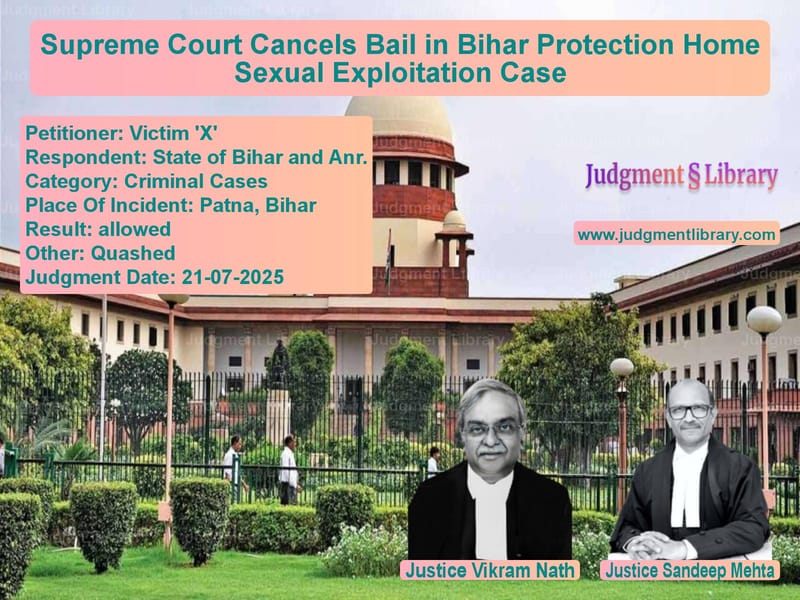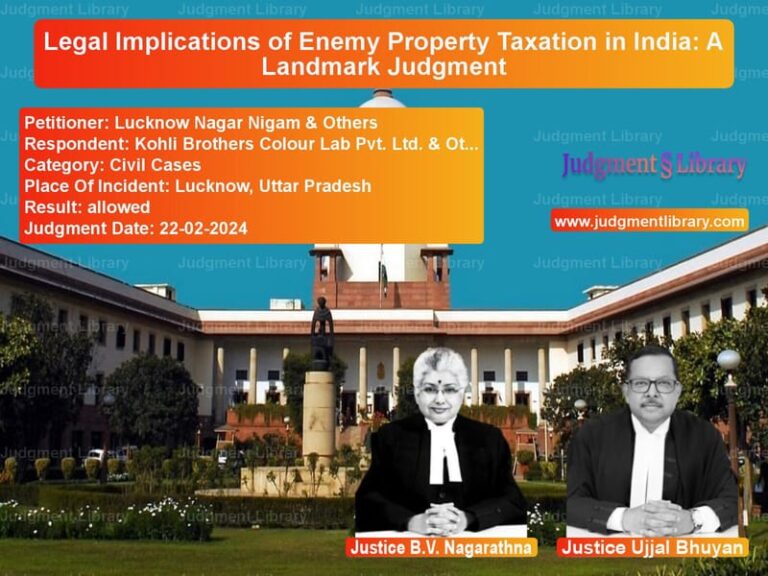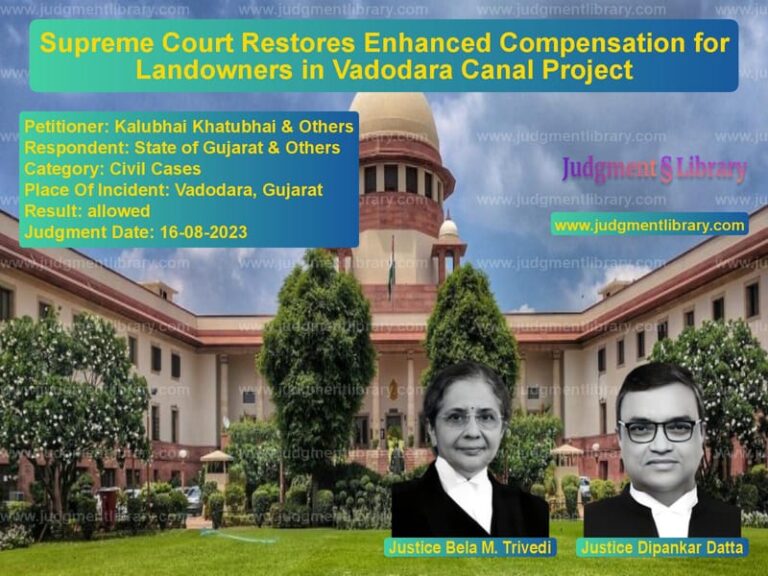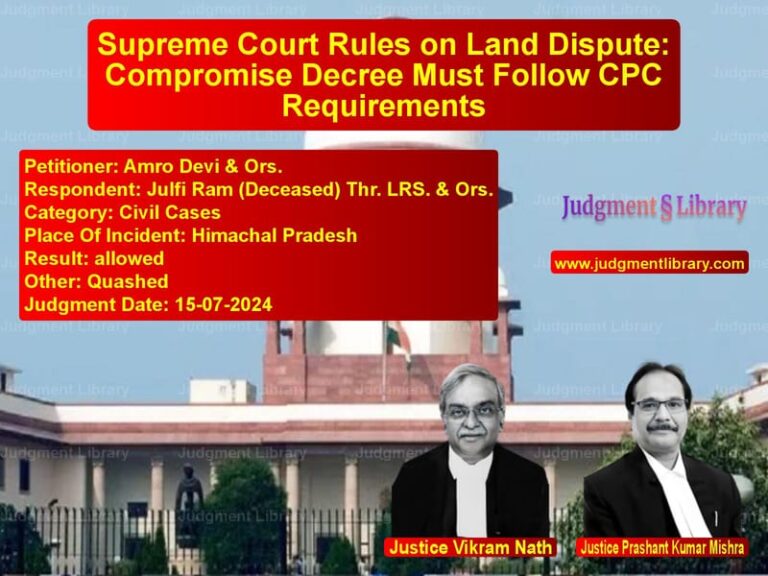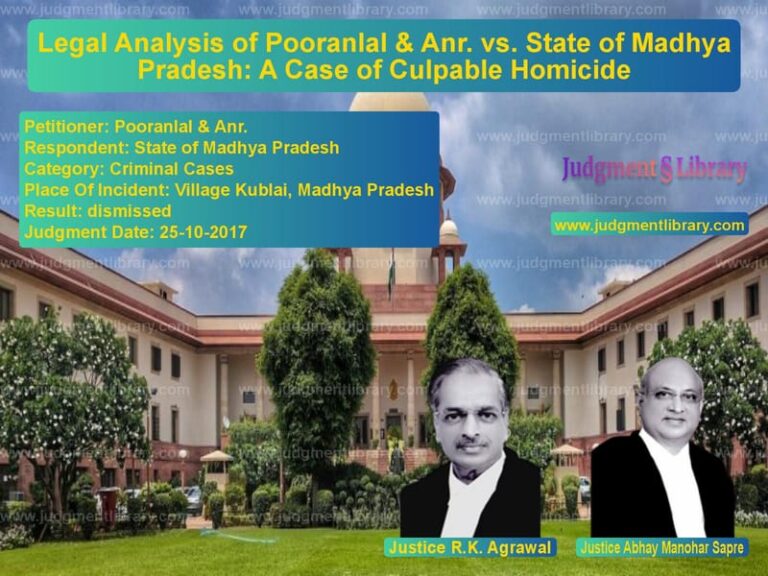Supreme Court Cancels Bail in Bihar Protection Home Sexual Exploitation Case
In a shocking case that exposes the vulnerability of women in state-run protection homes, the Supreme Court recently delivered a landmark judgment canceling the bail of a former superintendent accused of orchestrating sexual exploitation of female inmates. The case originated from Uttar Raksha Grih, a women’s protection home in Gaighat, Patna, where the person entrusted with protecting vulnerable women allegedly became their tormentor.
The case came to light through a newspaper report that caught the attention of the Patna High Court, which took cognizance of the horrific conditions and systematic abuse faced by women housed in the protection home. The investigation was monitored by the High Court, leading to the registration of Mahila P.S. Case No. 17 of 2022 against respondent No.2, who served as the Superintendent of the protection home.
The prosecution case revealed disturbing allegations against the accused official. “She while being posted as the Superintendent of the Uttar Raksha Grih, Gaighat, Patna indulged in administering intoxicating medicines and injections to the appellant-victim and other female inmates of the protection home, who were later on subjected to sexual exploitation and mental torture.” Even more alarming were the allegations that “she used to send the ladies housed in the protection home, outside for the purpose of providing sexual favours to influential people.”
During the investigation, multiple women came forward with similar accounts of abuse. Their statements recorded under Section 164 of the Code of Criminal Procedure described how they were sent out of the institution for providing sexual gratification to outsiders. Those who resisted were allegedly injected with intoxicants and sexually exploited while under the influence.
The legal battle began when the Special Court rejected the accused’s bail application on July 10, 2023. However, the High Court granted bail to respondent No.2 through a surprisingly brief order dated January 18, 2024, which simply stated: “Having heard learned counsel for the parties and taking into consideration that there is no specific allegation against the appellant, the Court is inclined to allow this appeal.”
The victim, represented by her counsel, approached the Supreme Court challenging this bail order. The appellant’s counsel presented compelling arguments highlighting the gravity of the situation. “The High Court granted bail to respondent No.2 by a cryptic order without assigning any reasons whatsoever and totally ignoring the critical fact that respondent No.2 being the Superintendent of the women protection home was a person in authority, who misused her position to exploit the helpless female inmates of the institution and deliberately orchestrated their sexual exploitation by various influential persons.”
Even more concerning was the development after the accused’s release on bail. The counsel revealed that “pursuant to the release of respondent No.2 on bail, she has been reinstated in service, and she is heading another protection home within the State of Bihar.” This raised serious questions about the state administration’s commitment to protecting vulnerable women. The counsel argued that “this approach of the State authorities in allowing respondent No.2 to continue functioning as a person in-charge of the protection home, despite there being allegations of misuse of power to facilitate sexual exploitation of female inmates would imminently expose the inmates to a grave risk of being subjected to sexual exploitation.”
The victim’s counsel also highlighted the threat to witnesses and the fair trial process, stating that “in case, respondent No.2 is allowed to remain on bail, there is an imminent danger of her influencing the witnesses and frustrating the trial. He pointed out that as a matter of fact, numerous threats have already been given to the witnesses of this case and hence, the continuance of respondent No.2 on bail would be detrimental to a fair trial.”
The State of Bihar supported the victim’s appeal, with the standing counsel acknowledging that “after thorough investigation, grave allegations of misuse of official position to exploit the helpless and destitute female inmates housed in the protection home have been substantiated.” However, the State could not explain why it had reinstated the accused to a similar position in another protection home.
The accused’s counsel defended the High Court’s order, arguing that “the High Court, while considering the bail application has taken note of the material available on record and rightly found that there are no specific allegations against respondent No.2 in the prosecution evidence.” He emphasized that “respondent No.2 being a woman had languished in custody for almost 500 days, since 27th August, 2022 and this was the most vital factor which weighed with the High Court in favour of grant of bail.”
The Supreme Court, after hearing all parties, expressed its deep concern about the case. The Court observed that “the allegations attributed to respondent No.2 shake the conscience of the Court. Respondent No.2 being posted as the Officer in-charge of the women’s protection home was required to work as a protector of the inmates, but she turned rogue and indulged in sexual exploitation of the helpless and destitute women who had been placed in the said protection home which is an institution created to provide them safety and security.”
In a powerful statement, the Court noted that “Thus, it is clearly a case, wherein the person put in the role of a saviour has turned into a devil.”
The Court relied on its recent judgment in Shabeen Ahmad v. The State of Uttar Pradesh & Anr., which emphasized the proper application of bail parameters in serious cases. Quoting from this precedent, the Court highlighted that “A superficial application of bail parameters not only undermines the gravity of the offence itself but also risks weakening public faith in the judiciary’s resolve to combat the menace.”
The judgment elaborated on the considerations for bail in serious crimes: “While considering as to whether bail ought to be granted in a matter involving a serious criminal offence, the Court must consider relevant factors like the nature of the accusations made against the accused, the manner in which the crime is alleged to have been committed, the gravity of the offence, the role attributed to the accused, the criminal antecedents of the accused, the probability of tampering of the witnesses and repeating the offence, if the accused are released on bail.”
The Court also found a fundamental legal flaw in the High Court’s proceedings – the violation of Section 15A(3) of the SC/ST Act, which mandates that victims must be heard in bail applications. “We may note that the impugned order could have been quashed on the solitary ground of non-compliance of Section 15A(3) of the SC/ST Act which mandates that notice to a victim is essential before a prayer for bail is being considered, in a case where the offence/s under the SC/ST Act have been applied.”
The Supreme Court expressed its firm opinion that “the present case is an exceptional one, wherein the grant of bail by the High Court to respondent No.2-accused by a cryptic order dated 18th January, 2024 has resulted into travesty of justice. Grant of bail to the person accused of such grave offences without assigning reasons shakes the conscience of the Court and would have an adverse impact on the society.”
The Court was particularly concerned about the accused’s reinstatement, noting that “respondent No.2-accused has been reinstated to the position of Superintendent of another protection home which speaks volumes about her clout and influence with the administration.”
In its concluding remarks, the Court allowed the appeal and canceled the bail granted to the accused. “The bail granted to respondent No.2-accused is hereby cancelled. She shall surrender before the trial Court within a period of four weeks from today, failing which, the trial Court shall cancel her bail bonds and ensure that she is taken into custody for the remainder of trial.”
The Court also directed that “The trial Court and the District administration shall ensure that proper protection and support is provided to the victims of the case.” However, the Court left the door open for future bail applications, stating that “In case there is any change of circumstances, respondent No.2-accused shall be at liberty to renew her prayer of bail before the appropriate forum.”
This judgment serves as a powerful reminder that positions of authority carry immense responsibility, and when those entrusted with protecting the vulnerable become their exploiters, the justice system must respond with utmost seriousness. The Supreme Court’s intervention not only corrected a legal error but also sent a strong message about the importance of protecting society’s most vulnerable members from those who abuse power and trust.
Petitioner Name: Victim ‘X’.Respondent Name: State of Bihar and Anr..Judgment By: Justice Vikram Nath, Justice Sandeep Mehta.Place Of Incident: Patna, Bihar.Judgment Date: 21-07-2025.Result: allowed.
Don’t miss out on the full details! Download the complete judgment in PDF format below and gain valuable insights instantly!
Download Judgment: victim-‘x’-vs-state-of-bihar-and-a-supreme-court-of-india-judgment-dated-21-07-2025.pdf
Directly Download Judgment: Directly download this Judgment
See all petitions in Bail and Anticipatory Bail
See all petitions in SC/ST Act Case
See all petitions in Judgment by Vikram Nath
See all petitions in Judgment by Sandeep Mehta
See all petitions in allowed
See all petitions in Quashed
See all petitions in supreme court of India judgments July 2025
See all petitions in 2025 judgments
See all posts in Criminal Cases Category
See all allowed petitions in Criminal Cases Category
See all Dismissed petitions in Criminal Cases Category
See all partially allowed petitions in Criminal Cases Category

